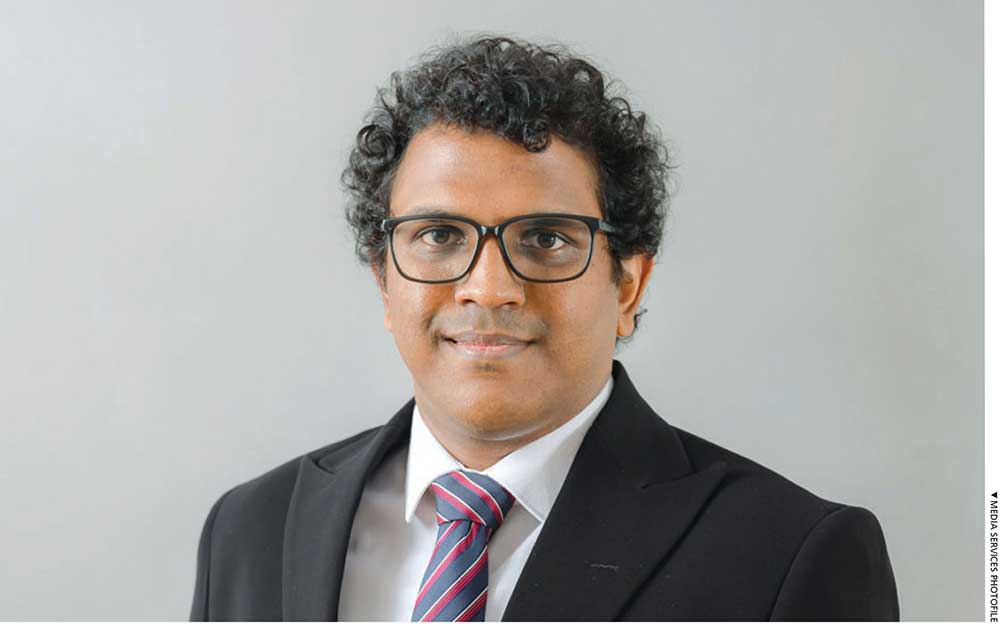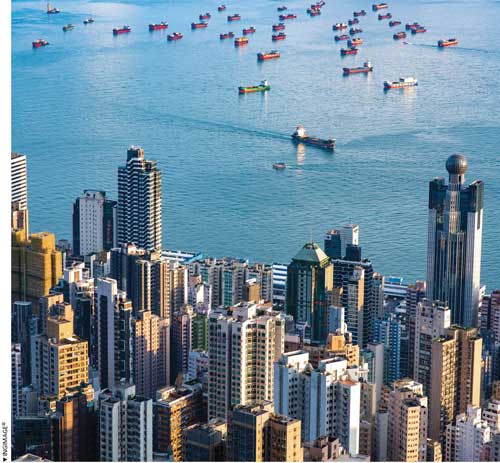Kithmina Hewage
A political-economic lens for policy

A Senior Advisor at the Centre for Asian Philanthropy and Society (CAPS) in Hong Kong, Kithmina Hewage’s interests lie in political economics, foreign direct investment, international trade policy and private sector development.
In his role at CAPS, Hewage – who is also a member of the World Economic Forum’s (WEF) Expert Network – leads policy engagement efforts with governments, philanthropists, corporates and nonprofits across 18 Asian economies, working to improve the quality and quantity of private social investment.
His prior academic and professional experience includes working on development policy research, design and implementation, in Sri Lanka, the US and Europe.
In this exclusive interview, Hewage sheds light on the relationship between politics and economics, and emphasises the importance of being able to communicate narratives and understand the interconnected nature of different aspects of life when it comes to policy-making.

Q: What sparked your interest in regulatory reforms – and why do you believe they are crucial in the context of private sector development?
A: I grew up with my grandparents and for as long as I can remember, we watched the Sinhala news at night together. It didn’t make much sense to me at the time; but it sparked an interest in current affairs.
This developed into a more specific interest in politics and economics in school amid my extracurricular activities, and I decided to study it in university.
During that time, I found that regulations were perfectly placed at the centre of politics and economics – they can make or break a nation. Good regulations help move things along in an economy by providing a clear set of rules and protecting the vulnerable from exploitation.
Bad regulations, as we in Sri Lanka are unfortunately well versed in can completely derail any form of productivity and breed corruption.
Q: Could you share a few insights into your journey in the field of international political economics?
A: I always wanted to work for Sri Lanka. As a small island economy, trade and investment were going to play an important role in how well we develop.
I found that discussions about economic policy in Sri Lanka tend to take place in two parallel worlds, and the economic and political circles rarely overlap. Looking at trade and investment policies through a political-economic lens is crucial to bridging that gap.
Ultimately, good economic policy is good politics but it’s important to communicate clearly how those policies align with the interests of the public, so that politics and economics go hand in hand. If we don’t, political expediency can ruin an economy and harm the country.
Part of Sri Lanka’s problem is that only a handful of people are able and willing to communicate this.
Even while working with stakeholders in other countries, approaching policy issues from a political-economic perspective is what has helped me the most – because it’s about aligning the personal, political and economic interests of all these stakeholders to solve a problem.
Q: Could you describe your work in Hong Kong now – and how it relates to your previous work in Sri Lanka?
A: Presently, I work as a senior policy advisor. In my role, I work with governments, companies, business leaders and nonprofits in 18 Asian economies.
Like in Sri Lanka, many economies in Asia are still developing and face development challenges of their own – be they poverty, inadequate access to education and healthcare or climate change-related challenges.
At the same time, much like Sri Lanka, most governments don’t have sufficient resources to address all these challenges.
So my work mainly focusses on design and implementing policies to increase private sector involvement in addressing these development issues through the likes of public-private partnerships (PPPs), impact investing and philanthropy, rather than solely depending on a government or foreign aid and debt.
Q: In your opinion, what are some of the most pressing global economic challenges the world faces today?
A: To me, the most pressing global challenge is inequality – this relates to economic as well as social and political inequality.
For all the economic development and advances in the world, the gap between the rich and poor has widened, as has the gap between the political and social classes. Because of this, economic and political decisions are made to safeguard the interests of a few.
Consider Sri Lanka’s recent economic crisis. Those who were responsible and benefitted from bad policy choices haven’t faced any consequences while the public is bearing the costs.
So looking ahead, I strongly feel that the most fundamental policy challenge is to ensure that we address inequality and help ‘level up’ those who have been left behind.

Q: Are there specific trends or developments that you believe policy makers and the public should be paying more attention to – and if so, what are they?
A: The first trend is that around the world, we’re losing our ability to disagree agreeably. Showing respect to people you have disagreements with, and trying to find a sensible, balanced and moderate approach (based on accurate information to a problem) is seen as a sign of weakness.
It’s the extreme view that receives more coverage; we’re moving away from evidence-based policy-making and embracing ideology-based decisions, which is dangerous.
Policy makers and the public should be paying more attention to this because the more we remain within our own extreme bubbles, the more we become intolerant of opposing views – and we’re more likely to be misled by misinformation and lies.
This is partly why the world is so divided today.
On a more positive note, the second trend is that younger generations are more socially conscious entrepreneurs than their predecessors. I see this regularly while working with social enterprises where young people use business models to address social issues while making a profit – especially in East Asia and the ASEAN region.
This is a win-win for everyone because it helps address issues like climate change or access to education in rural areas – and from a government perspective, it also creates employment for the youth in new industries.
Q: What advice do you have for individuals aspiring to work in the fields of research, policy and international economics?
A: Invest time on learning how to communicate a narrative. Research is not about memorising a topic or simply collecting a lot of data. Access to the internet and tools like ChatGPT have made that type of skill redundant.
What’s important is bringing together different pieces of information in a way that can make sense to a non-expert in that field – whether it’s a policy maker or member of the public.
Communicating an argument about why a policy should or shouldn’t be implemented and how it will affect a person’s day-to-day life is more important in this field than publishing a 100 page report that nobody reads.
Additionally, I strongly encourage people to develop interests outside their academic expertise – be it in sports, art, theatre, technology or other areas. Have a sense of what’s going on in the world beyond your subject.
Q: How has your cultural identity shaped your career choices or interactions in the professional sphere?
A: I grew up in quite a multicultural environment – within my family, through my mother’s work and my various extracurriculars. And I suppose this made me a cultural chameleon of sorts.
This has definitely helped me in my work because I’m comfortable adapting to new cultures and experiences.
For example, taking part in different cultural experiences – such as visiting a temple in Tokyo or having lunch in a small dim sum restaurant in Hong Kong – has helped me connect with my counterparts and understand them better than I would at an official meeting.

Q: And finally, how do you maintain a connection to the culture of your homeland while living overseas?
A: Theshort answer is cricket and food. I play cricket for the Sri Lankans Cricket Club Hong Kong and my teammates come from diverse backgrounds. Spending time with them on Sundays playing cricket brings me immense joy (minus the body aches that follow!) and connects me to home.
I also have a few friends here whom I’ve known from Sri Lanka or connected with through friends in Sri Lanka. We meet occasionally for a home cooked Sri Lankan meal. Nothing beats a good old Sri Lankan style parippu and chicken curry!
FACT FILE
FAMILY
Mother – Saumya
Father – Ranjith
Wife – Hansika
Canine babies – Sherlock, Watson and Taashy
SCHOOLING
Ananda College
Colombo International School (CIS)
HIGHER EDUCATION
Johns Hopkins University
University College London (UCL)
PRESENT OCCUPATION
Senior Advisor – Centre for Asian Philanthropy and Society (CAPS)
TERRITORY OF RESIDENCE
Hong Kong
CITY OF RESIDENCE
Hong Kong
